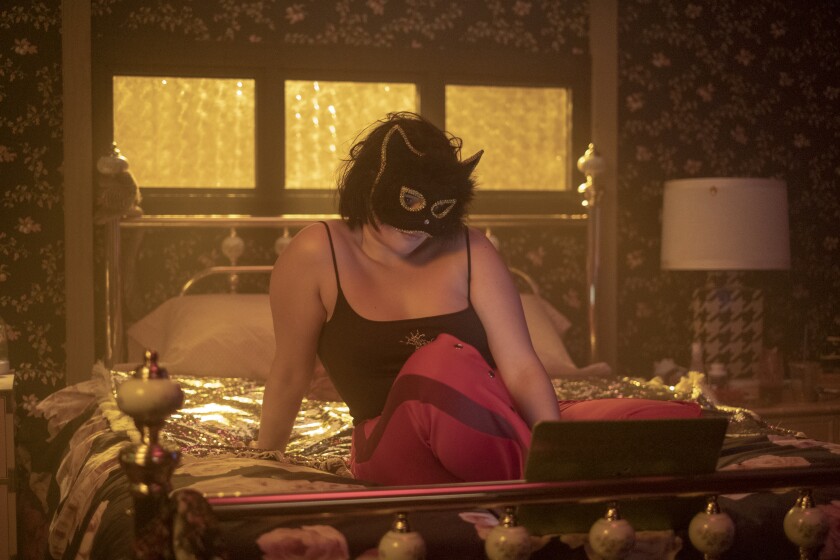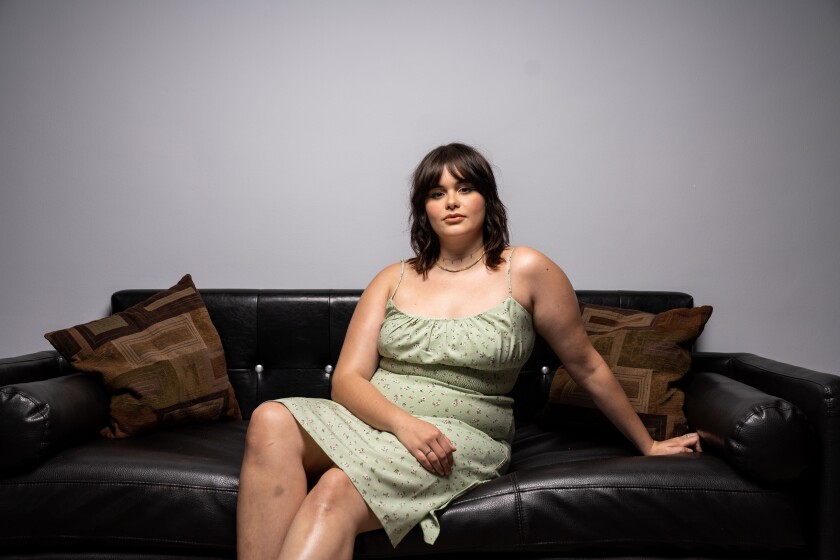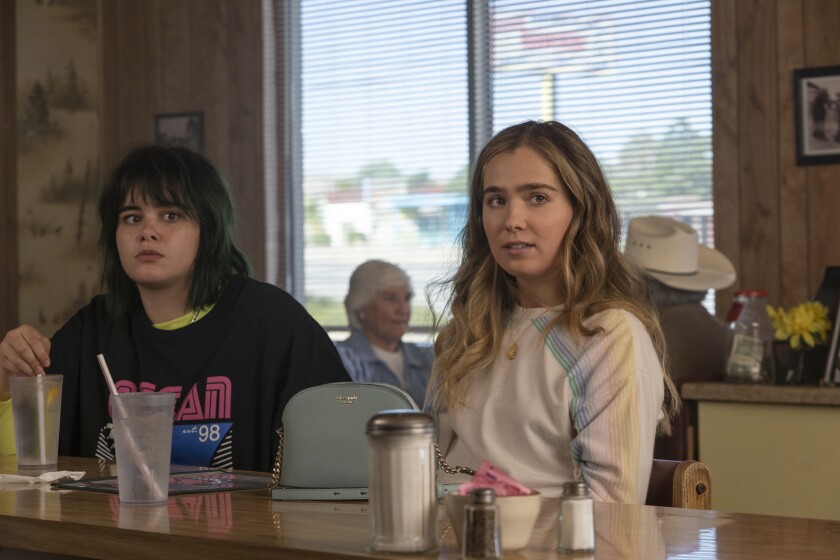
When Barbie Ferreira was a plus-size model, most of her friends looked like her. Soft, fleshy, bountiful. She was part of a group text chain, “The Fat Agenda,” whose members labeled themselves as the “fats in fashion.” As a teenager, she’d hated that word — “fat.” It was weaponized by schoolmates and anonymous commenters who trolled her Tumblr. But when she and the other curvy models began using it as a self-descriptor, it no longer felt as offensive.
“Reclaiming that word felt empowering,” she says. “‘Fat’ used to be the worst thing I could ever be called. But ‘fat’ is not a bad word. I really had to train myself to think: Being fat is the least of my problems. Am I a good person? Am I responsible? Am I talented? I’m still training myself, I think.”
Ferreira’s relationship to her body has continued to evolve since leaving the fashion industry to pursue an acting career. In Hollywood, the 23-year-old says it has been difficult to find a community of like-sized peers. She does not personally know other performers who “can relate to the body shaming issue.”
“It’s the beginning of all this,” she says, meaning more inclusive onscreen representation. “People are starting to figure out that maybe they don’t always cast actors who are super thin. But I know there will be more. I just have to keep going.”
On “Euphoria,” the HBO series that introduced Ferreira to a wider audience last year, Ferreira’s weight is central to her character’s backstory. She plays Kat, a high school student haunted by the fallout from a boyfriend who dumped her after she gained 20 pounds. But Kat regains confidence after secretly deciding to become a cam girl, locating an online trove of men who find her and her kinky leather get-ups immensely attractive.

In Ferreira’s first movie role, however, her body is never so much as mentioned. The film, “Unpregnant” — which debuted on HBO Max on Thursday — follows two Missouri high school seniors forced to road trip to New Mexico so that one of them (played by Haley Lu Richardson) can legally get an abortion. It’s a comedy, a genre Ferreira was eager to try. But she was also drawn to the project because it did not call attention to the way she looks.
“Before ‘Euphoria,’ everything had to do with my body — ‘plump’ or ‘overweight’ girl,’” she recalls. “When it’s like, ‘Hello, there! I am big and that is why I am sad today’ — you really don’t need to say all that. I’m like, why don’t we just ignore my body? And in this movie, me just existing is enough.”
They reached a turning point. People share why they switched relapsing MS treatment. What will your turning point be?
Ferreira is in the living room of her Silver Lake apartment, where one of her three cats keeps entering the video chat screen. She is sitting on a new couch she was recently forced to purchase from Ikea after one of her felines infested her home with fleas. It’s temporary furniture, covered in a shoddy bedsheet, that she’ll get rid of as soon as she moves into the home she just bought — her first. The house, she says, is cozy and old — “kind of the opposite of the glass houses everyone is buying in L.A.” — and she plans to cover it in wallpaper and keep chickens in the yard.
“I’m a maximalist,” she says, turning the camera to show off her current gold- and purple-painted walls. She sets her device on the kitchen counter and starts rummaging through her refrigerator. She picks up a sweet potato, deciding to whip up a hash with ground chicken and garlic spread.
Ferreira says she is not a skilled cook, despite the fact that her mother is a professional chef. She is particularly close to her mom, though, who gave birth to her at 21 — just a few years after moving from Brazil to Queens, N.Y. Ferreira says she was raised in a progressive household; her second birthday party was an adults-only affair held at a West Village bar where the entertainment was a drag show. She is pro-choice and did “Unpregnant” in part to promote the idea that abortion is a human right.
“Abortion is so not political to me; it’s just healthcare,” she says. “Trying to police people’s bodies? We have enough policing going around. I never thought of Planned Parenthood as an abortion clinic. I always thought of it as somewhere that is really low-priced — that I could afford even as a teenager — where I could get birth control or go if I had a yeast infection. It’s like a doctor’s office. And always underfunded.”
Growing up, Ferreira’s mom spoke openly about sex. She frequently asked her daughter, “Are you gay?” before Ferreira had even begun to identify as queer.
“I mean, she ended up being right,” Ferreira says with a laugh. “When I first started dating, I kind of got stuck in this cycle of compulsory heterosexuality. I wasn’t feeling the relationships, but I wanted attention really bad. That also comes with growing up super insecure. But I never really saw myself in a relationship with a man, even as a kid.”

She began calling herself queer about three years ago and has been in a relationship with a woman for the past year. She says she’s attracted to queer individuals — “trans men, nonbinary people. I don’t like straight-cis men. I don’t think we even get along that well, other than friendship.”
At high school in the New Jersey suburbs — where she and her family later moved — she never generated interest from boys and was still awaiting her first kiss in senior year. She was “ignorable,” she says, sitting alone at lunch and eventually taking herself to the prom dressed in an all-white pantsuit. But like her “Euphoria” character, Ferreira was popular online. After starting a Tumblr, she found a clutch of followers who were into her unique look — a “pastel grunge” aesthetic marked by her long hair and septum ring. Some of them suggested she model, which surprised Ferreira: “Girl, what? I’m thick.”
Still, she decided to submit some photos of herself to American Apparel’s casting department, and they bit. Up to that point, she’d deliberately shown only her face in the photos she posted on her blog. When the retail campaign was released, the full-body images of Ferreira were “reblogged, like, 10,000 times, and each one — every single one — was making fun of me.”
The online vitriol was so aggressive that Ferreira’s mother urged her to abandon the idea of modeling. But she persisted, landing another job with American Eagle’s Aerie and this time going viral as a body-positive role model. Her proudly unretouched bikini photos attracted the interest of Wilhelmina’s curve division, and before long she was turning up in spots for Lane Bryant, ASOS and Target.
“I thought it was going to be really glamorous — like, ‘Oh, my God, I get to go to Europe and work!’” she says, dropping her sweet potato slices into a frying pan. “But I was so young. I’d lose my ID and have to sleep on the floor in Miami. Or I’d be in a motel in Hamburg and my credit card didn’t work. I’d always have four flights a week in the middle seat on Spirit Airlines.”
Apart from the unforgiving lifestyle, Ferreira soon grew tired of criticism from her agency.
“They started telling me that I wasn’t doing well or booking jobs and needed to lose weight,” she says. “They were just really rude to me. So I was like, I need to get out of this industry immediately.”
Ferreira had always wanted to be an actress — she did theater at the Variety Boys & Girls Club of Queens as a kid — but thought her look might prove restrictive. She never saw anyone who looked like her on television, and for a long time she was convinced she couldn’t be an actress unless she lost a substantial amount of weight.
But then the audition for “Euphoria” came up — a gig every single one of her plus-size model friends in New York was going out for. Because her character on the show is somewhat of an outsider, Ferreira was nervous about playing another “high school outcast” in “Unpregnant.” The film would call on her to play a brash teen with green hair who has lost her now-pregnant best friend to the mean girl crowd.

But Rachel Lee Goldenberg, who directed the film, highlighted the differences in the two young female characters — noting that in the movie, Ferreira’s character’s wild side would serve as a front for inner turmoil. On set, the filmmaker was impressed by Ferreira’s ability to reach deep emotional levels on cue.
“Barbie is so great at just jumping in and doing it,” says Goldenberg. “Haley likes to find a deep truth in the moment, and Barbie is able to create that pretty quickly for herself. She can jump into a scene and do a line five different ways. There was one scene where a stunt guy had showed them how to fall out of a car but be just a foot from the ground. But Barbie said: ‘I’m just gonna do it.’ She went from full standing and threw herself on the ground and rolled. Everyone just gasped, and she was like, ‘I’m fine!’”
Moving forward, Ferreira says, she hopes to follow a similar freewheeling approach to her career. She’s not “overly serious” about strategizing about the roles she takes and says the actress she most admires is Tilda Swinton. She wants her next project to be something “very wild,” playing something like a “goblin/vampire/witch/possessed child.”
“Or a tree,” she says, half-serious. “Maybe the animated voice of a tree.”
Ben Evans, a painter who has become one of Ferreira’s best friends, says she always talks to him about how she wants to be in “some very cool, indie horror movie, which I think she’d kill in.”
“We constantly talk about the future, and she’s dealt with all of this really well,” says Evans, referring to her post-“Euphoria” fame. “I remember going to Sephora with her the day after her episode came out, and everyone was mobbing her. They’ll be, like, ‘I have been following you for literally the past 10 years and feel like I have a friend in you.’ There’s a lot of people who have really watched her evolve and are super impressed.”
Ferreira met Evans through mutual friends, and they realized they shared an affinity for marijuana. These days, she’s trying to curb her smoking habit, though she does suck on a Juul throughout our interview.
“I can’t do anything high anymore,” she laments. “It was medicine for me, because I had so much anxiety. But as I get older, I just don’t need it as much. I hike and work out now to get the same kind of anxiety release.”
She holds her finished sweet potato hash up to the camera, even though she has deemed it “ugly.” At the moment, she’s not eating red meat, sugar or cheese — rules she says she has temporarily implemented after months of indulging in too much doughnuts and steak during quarantine.
“I have been binge eating because for me food is emotional — and I start putting emotional weight on,” she says. “Sometimes I’m like, ‘I’m the hottest girl in the world!’ And sometimes I’m like, ‘I’m the ugliest girl in the world!’ That doesn’t come from logic, and I essentially look the same in both scenarios, but it’s just my feeling.
“Sometimes I love talking about it, and sometimes I don’t. Sometimes I’m fed up that I have to even acknowledge my body. People don’t ask thin people: ‘How do you have the confidence to go outside? How do you have the confidence to wear clothes?’ I have been called brave just for existing my whole life.”






